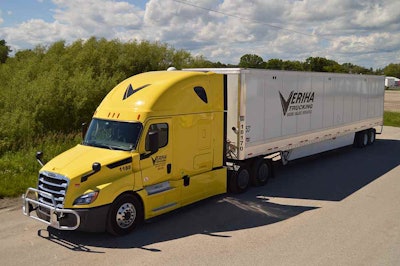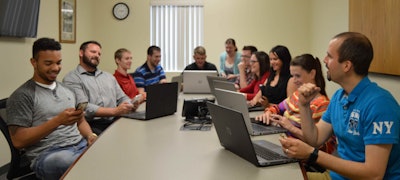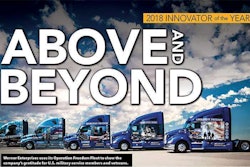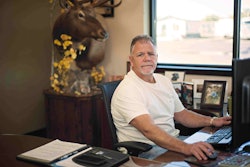CCJ Innovators profiles carriers and fleets that have found innovative ways to overcome trucking’s challenges. If you know a carrier that has displayed innovation, contact CCJ Editor Jeff Crissey at [email protected] or 800-633-5953.
—

When she first joined the company, Smerchek immediately identified the need to improve the organization’s culture to sustain future growth. In 2010, when she took the reins of the business as president, Smerchek began the process of transforming the makeup of company leadership. “At the end of the day, your culture is your people — who you hire, who you fire and who you promote,” she says.
Today, Veriha’s workforce development efforts are evident in its diversified employee base. Sixty percent of front office staff are women, including 62 percent in leadership roles. Forty percent of the company’s front office staff, 47 percent of the shop personnel and nearly 30 percent of its drivers are millennial.
“When millennials look for an employer, they are looking for passion, purpose and bliss,” says Smerchek. “We truly have to adjust our leadership style for millennials … making sure they are going after a goal and that we are challenging those associates.”
 Forty percent of Veriha Trucking’s front office staff, 47 percent of the shop personnel and nearly 30 percent of its drivers are millennial. “They are looking for passion, purpose and bliss,” says Karen Smerchek, the company’s president.
Forty percent of Veriha Trucking’s front office staff, 47 percent of the shop personnel and nearly 30 percent of its drivers are millennial. “They are looking for passion, purpose and bliss,” says Karen Smerchek, the company’s president.One trait common among millennials in the workforce is the need for consistency. To offer more stability for its drivers, five years ago Veriha instituted a guaranteed pay package independent of freight availability, weather and traffic factors that otherwise could erode a driver’s earning potential. As the company’s average length of haul contracted, the guaranteed pay program helped reassure drivers on shorter hauls.
Instituting a guaranteed pay package was a learning curve, and it took the company some time to hone the program to benefit both Veriha and its drivers.
“We went in probably a little too high and saw some drivers actually have lower performance because of guaranteed pay,” says Smerchek. “We had to make adjustments based on the number of miles and made a final adjustment that is working tremendously where that [guaranteed pay] number isn’t set, but their performance is driving that number. No driver in our fleet has the same guaranteed pay. It’s based on how they are performing.”
Having a strong multigenerational workforce required Veriha to reexamine its communications strategy. No two drivers are exactly alike, but age often separates them into groups with common preferences.
Veriha recently made a large investment in in-cab communications, installing tablets throughout the fleet. “You can see the drivers who are more tech-savvy and are loving the investment we just made on their behalf,” says Smerchek. “Then there are others that truly want time face-to-face or time on the phone.”
The key to managing a diverse workforce, says Smerchek, is to adjust your communication style based on the listener.
“Some of them you can be very brief and direct with, and others you need to ensure have that personal connection at the end of every conversation. But regardless of what generation they are in, every single person appreciates the gratitude you give them for working hard and doing what you asked. Recognition is something that no one can give themselves. They can only get that from others.”
Doing ‘the next right thing’
As Veriha continued its efforts to develop its workforce in recent years, management realized the distinction between simply encouraging employees and empowering them to be their best selves.
 To offer more stability for its drivers, five years ago Veriha Trucking instituted a guaranteed pay package independent of freight availability, weather and traffic factors that otherwise could erode a driver’s earning potential.
To offer more stability for its drivers, five years ago Veriha Trucking instituted a guaranteed pay package independent of freight availability, weather and traffic factors that otherwise could erode a driver’s earning potential.Smerchek began to study behavioral science for her own personal development to become a more effective company leader. “It takes something you did that you knew would work and puts the science behind it, so you now know why it works based on how the brain functions,” says Smerchek.
Realizing the impact behavioral science could have on the entire organization, Smerchek rolled it out to the front office and fleet leaders, who meet weekly to discuss best practices and hold each other accountable on specific goals.
Veriha’s vision for its new science-based coaching is to encourage employees throughout the organization to go beyond what they think is possible.
“Having confidence is key to success, and there are a lot of people out there that are lacking it, even though you might not be able to see it,” says Smerchek. “Their brain is telling them what they can’t do instead of you encouraging them to go after something big. Until that happens, they aren’t going to hit their full potential.”
Smerchek cites a coaching opportunity around lowering a driver’s idle time from 50 percent to 20 percent. “They are going to say, ‘Wow, 30 percent, I can’t do it.’ If it’s too large of a jump, they aren’t going to get there. But just because we have people that far away from hitting goals doesn’t mean they are a lost cause.”
Veriha breaks large goals down into smaller, more achievable milestones in 30- to 90-day windows so employees can experience what success feels like. “Then the conversation becomes, ‘What step are you going to take today?’ Let’s just do the next right thing and take it one step at a time so that when they see improvement, they feel successful and are willing to do the next right thing again.”
In addition to driving performance improvements for idling, safety, trailer utilization and health and wellness, the use of behavioral science has had a positive impact on driver retention.
“Once you solve a problem for a driver, they become more loyal to your organization because they know they are going to have another problem, but now they also have the confidence in you that you truly care about solving their problem and doing what is best for them,” says Smerchek.
The art of understanding
Understanding the importance of social collaboration and emotional intelligence traits has contributed to Smerchek’s diverse workforce. Veriha hires for the person and their total skill package and not just the technical skills you generally see on the resume.
“Ultimately, we are managing the emotions of our people, whether they are drivers or office associates,” says Smerchek. “If they are in a good emotional state, they are going to perform at a high level.”












